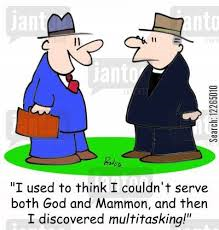CATHOLIC NUNS TEACH HEALTHCARE IN SIERRA LEONE
PHILIPPIANS 4:10-19 ©
It is a great joy to me, in the Lord, that at last you have shown some concern for me again; though of course you were concerned before, and only lacked an opportunity. I am not talking about shortage of money: I have learnt to manage on whatever I have, I know how to be poor and I know how to be rich too. I have been through my initiation and now I am ready for anything anywhere: full stomach or empty stomach, poverty or plenty. There is nothing I cannot master with the help of the One who gives me strength. All the same, it was good of you to share with me in my hardships. In the early days of the Good News, as you people of Philippi well know, when I left Macedonia, no other church helped me with gifts of money. You were the only ones; and twice since my stay in Thessalonika you have sent me what I needed. It is not your gift that I value; what is valuable to me is the interest that is mounting up in your account. Now for the time being I have everything that I need and more: I am fully provided now that I have received from Epaphroditus the offering that you sent, a sweet fragrance – the sacrifice that God accepts and finds pleasing. In return my God will fulfil all your needs, in Christ Jesus, as lavishly as only God can.
 This kind of sharing which goes beyond family, kinship groups, nationality and race was based on the recognition of one new people under God. Certainly this recognition came from a common belief in Jesus Messiah, but it was not sectarian; it saw all people as potentially one. Our modern, secular recognition of the interdependence of humanity and the need to respond to the need of others, as in the Ebola epidemic, which is the most heartening aspect of contemporary life, has grown out of the Chrstian gospel of the shared life of God’s children. I think a world where Christian Aid resources are often channelled towards Muslim or Hindu people, would suprise Paul but also give him joy.
This kind of sharing which goes beyond family, kinship groups, nationality and race was based on the recognition of one new people under God. Certainly this recognition came from a common belief in Jesus Messiah, but it was not sectarian; it saw all people as potentially one. Our modern, secular recognition of the interdependence of humanity and the need to respond to the need of others, as in the Ebola epidemic, which is the most heartening aspect of contemporary life, has grown out of the Chrstian gospel of the shared life of God’s children. I think a world where Christian Aid resources are often channelled towards Muslim or Hindu people, would suprise Paul but also give him joy.GospelLuke 16:9-15 ©
Jesus said to his disciples, ‘I tell you this: use money, tainted as it is, to win you friends, and thus make sure that when it fails you, they will welcome you into the tents of eternity. The man who can be trusted in little things can be trusted in great; the man who is dishonest in little things will be dishonest in great. If then you cannot be trusted with money, that tainted thing, who will trust you with genuine riches? And if you cannot be trusted with what is not yours, who will give you what is your very own?
‘No servant can be the slave of two masters: he will either hate the first and love the second, or treat the first with respect and the second with scorn. You cannot be the slave both of God and of money.’
The Pharisees, who loved money, heard all this and laughed at him. He said to them, ‘You are the very ones who pass yourselves off as virtuous in people’s sight, but God knows your hearts. For what is thought highly of by men is loathsome in the sight of God.’


